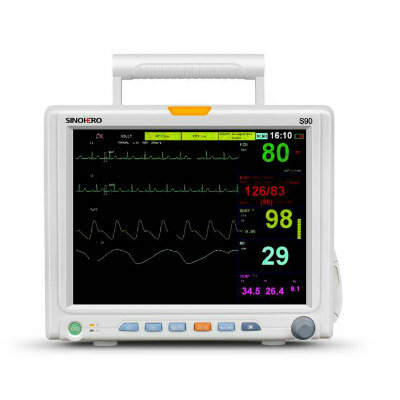Black Teens More Affected by Nicotine
|
By HospiMedica staff writers Posted on 09 Feb 2006 |
A new study has found that black U.S. teenagers are more affected by nicotine from a cigarette than their white classmates.
In the study, 61 white and 30 black adolescent smokers had a blood analysis to measure their levels of cotinine, a chemical product from the breakdown of nicotine. The black smokers seemed to more slowly metabolize, or break down, the nicotine from the cigarettes, leaving higher levels of cotinine, despite the fact that the black teens smoked only 15 cigarettes per day, compared to an average of nearly 20 a day for the white teens. The study was published in the January 2006 edition of the journal Ethnicity and Disease.
The study results remained statistically significant after controlling for smoking menthol cigarettes. Recent findings have suggested that menthol might increase the addictiveness of tobacco, and that menthol may play a role in inhibiting nicotine metabolism. Studies also have indicated that black smokers show a preference for menthol cigarettes compared to white smokers.
"Previous research in adults showed that black smokers take in 30 percent more nicotine per cigarette and take longer to rid their bodies of the drug, compared to white smokers,” said Dr. Nora Volkow, of the U.S. National Institute on Drug Abuse (Bethesda, MD, USA; www.nida.nih.gov), which conducted the study. "These findings may constitute a strong warning to black youth to keep from smoking in the first place.”
"Our findings support the hypothesis that racial and ethnic differences in nicotine metabolism exist among adolescent smokers, with black teens smoking less but being exposed to as much nicotine as white teens,” said Dr. Eric Moolchan of NIDA's teen tobacco-addiction research clinic in Baltimore (Maryland, USA)
In the study, 61 white and 30 black adolescent smokers had a blood analysis to measure their levels of cotinine, a chemical product from the breakdown of nicotine. The black smokers seemed to more slowly metabolize, or break down, the nicotine from the cigarettes, leaving higher levels of cotinine, despite the fact that the black teens smoked only 15 cigarettes per day, compared to an average of nearly 20 a day for the white teens. The study was published in the January 2006 edition of the journal Ethnicity and Disease.
The study results remained statistically significant after controlling for smoking menthol cigarettes. Recent findings have suggested that menthol might increase the addictiveness of tobacco, and that menthol may play a role in inhibiting nicotine metabolism. Studies also have indicated that black smokers show a preference for menthol cigarettes compared to white smokers.
"Previous research in adults showed that black smokers take in 30 percent more nicotine per cigarette and take longer to rid their bodies of the drug, compared to white smokers,” said Dr. Nora Volkow, of the U.S. National Institute on Drug Abuse (Bethesda, MD, USA; www.nida.nih.gov), which conducted the study. "These findings may constitute a strong warning to black youth to keep from smoking in the first place.”
"Our findings support the hypothesis that racial and ethnic differences in nicotine metabolism exist among adolescent smokers, with black teens smoking less but being exposed to as much nicotine as white teens,” said Dr. Eric Moolchan of NIDA's teen tobacco-addiction research clinic in Baltimore (Maryland, USA)
Latest Patient Care News
- Portable Biosensor Platform to Reduce Hospital-Acquired Infections
- First-Of-Its-Kind Portable Germicidal Light Technology Disinfects High-Touch Clinical Surfaces in Seconds
- Surgical Capacity Optimization Solution Helps Hospitals Boost OR Utilization

- Game-Changing Innovation in Surgical Instrument Sterilization Significantly Improves OR Throughput
- Next Gen ICU Bed to Help Address Complex Critical Care Needs
- Groundbreaking AI-Powered UV-C Disinfection Technology Redefines Infection Control Landscape
- Clean Hospitals Can Reduce Antibiotic Resistance, Save Lives
- Smart Hospital Beds Improve Accuracy of Medical Diagnosis
- New Fast Endoscope Drying System Improves Productivity and Traceability
- World’s First Automated Endoscope Cleaner Fights Antimicrobial Resistance
- Portable High-Capacity Digital Stretcher Scales Provide Precision Weighing for Patients in ER
- Portable Clinical Scale with Remote Indicator Allows for Flexible Patient Weighing Use
- Innovative and Highly Customizable Medical Carts Offer Unlimited Configuration Possibilities
- Biomolecular Wound Healing Film Adheres to Sensitive Tissue and Releases Active Ingredients
- Wearable Health Tech Could Measure Gases Released From Skin to Monitor Metabolic Diseases
- Wearable Cardioverter Defibrillator System Protects Patients at Risk of Sudden Cardiac Arrest
Channels
Critical Care
view channel
Ingestible Smart Capsule for Chemical Sensing in the Gut Moves Closer to Market
Intestinal gases are associated with several health conditions, including colon cancer, irritable bowel syndrome, and inflammatory bowel disease, and they have the potential to serve as crucial biomarkers... Read moreNovel Cannula Delivery System Enables Targeted Delivery of Imaging Agents and Drugs
Multiphoton microscopy has become an invaluable tool in neuroscience, allowing researchers to observe brain activity in real time with high-resolution imaging. A crucial aspect of many multiphoton microscopy... Read more
Novel Intrabronchial Method Delivers Cell Therapies in Critically Ill Patients on External Lung Support
Until now, administering cell therapies to patients on extracorporeal membrane oxygenation (ECMO)—a life-support system typically used for severe lung failure—has been nearly impossible.... Read moreSurgical Techniques
view channel
Pioneering Sutureless Coronary Bypass Technology to Eliminate Open-Chest Procedures
In patients with coronary artery disease, certain blood vessels may be narrowed or blocked, requiring a stent or a bypass (also known as diversion) to restore blood flow to the heart. Bypass surgeries... Read more
Intravascular Imaging for Guiding Stent Implantation Ensures Safer Stenting Procedures
Patients diagnosed with coronary artery disease, which is caused by plaque accumulation within the arteries leading to chest pain, shortness of breath, and potential heart attacks, frequently undergo percutaneous... Read more
World's First AI Surgical Guidance Platform Allows Surgeons to Measure Success in Real-Time
Surgeons have always faced challenges in measuring their progress toward surgical goals during procedures. Traditionally, obtaining measurements required stepping out of the sterile environment to perform... Read moreHealth IT
view channel
Printable Molecule-Selective Nanoparticles Enable Mass Production of Wearable Biosensors
The future of medicine is likely to focus on the personalization of healthcare—understanding exactly what an individual requires and delivering the appropriate combination of nutrients, metabolites, and... Read more
Smartwatches Could Detect Congestive Heart Failure
Diagnosing congestive heart failure (CHF) typically requires expensive and time-consuming imaging techniques like echocardiography, also known as cardiac ultrasound. Previously, detecting CHF by analyzing... Read moreBusiness
view channel
Expanded Collaboration to Transform OR Technology Through AI and Automation
The expansion of an existing collaboration between three leading companies aims to develop artificial intelligence (AI)-driven solutions for smart operating rooms with sophisticated monitoring and automation.... Read more

















